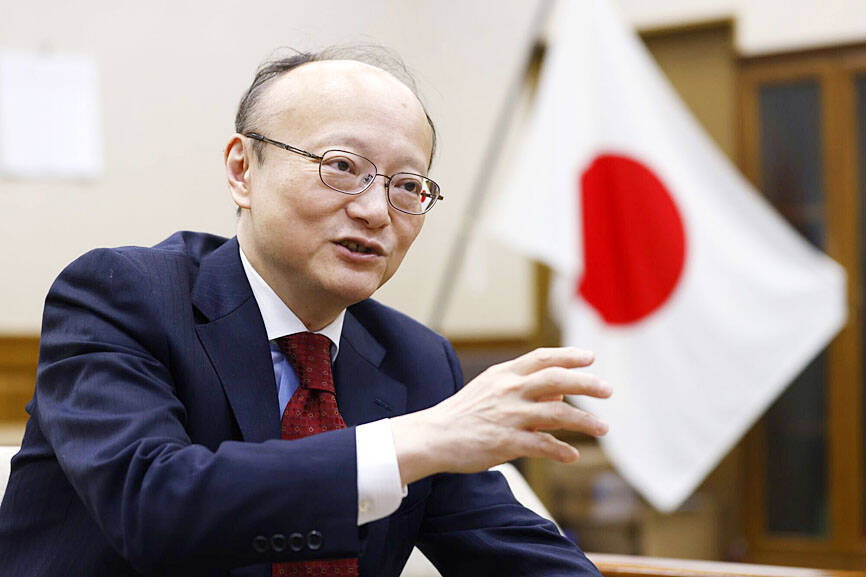Japan’s top currency official said that recent yen weakness is odd and out of line with current economic fundamentals, reaffirming his commitment to act if needed to prevent excessive swings in the exchange rate.
“I strongly feel the recent sharp depreciation of the yen is unusual, given fundamentals such as the inflation trend and outlook, as well as the direction of monetary policy and yields in Japan and the US,” Japanese Vice Minister for International Affairs Masato Kanda said in an interview yesterday. “Many people think the yen is now moving in the opposite direction of where it should be going.”
Kanda’s remarks come amid intense market scrutiny over whether the government would step into the currency market to stem recent falls in the yen, following the Bank of Japan’s decision last week to raise interest rates for the first time since 2007. The currency slid to a 34-year low of ¥151.97 per US dollar on Wednesday, prompting Japanese Minister of Finance Shunichi Suzuki to increase verbal warnings, strongly hinting that Japan could intervene.

Photo: Bloomberg
Finance authorities also convened a three-way meeting, a gathering often used to show heightened concern among policymakers over market movements.
“We are currently monitoring developments in the foreign exchange market with a high sense of urgency,” Kanda said. “We will take appropriate measures against excessive foreign exchange moves without ruling out any options.”
Kanda reiterated the view that Japan is not guarding specific exchange rate levels, but is looking at the direction and speed of movements when assessing developments in the currency market, echoing Suzuki’s comments.
Japan had no defense line on exchange rates, Suzuki said when asked whether the ¥152 mark against the US dollar was a line in the sand.
Tokyo’s biggest intervention splurge was in 2022, after the yen approached 152, though the slide in that direction was much more rapid than currently seen.
Market participants try to gauge the proximity to possible market intervention from the language used by authorities.
“I am just saying what I think is right at the time,” Kanda said, referring to his choice of words.
Behind the yen’s weakness is the view among market players that the difference in policy rate and yields between Japan and its peers, including the US, would remain wide for some time.
Bank of Japan Governor Kazuo Ueda pledged to maintain an accommodative environment when the bank decided to raise its benchmark interest rate last week — ending the world’s last negative rate — pouring cold water on expectations that the bank would soon consider a second hike.
He favors a gradual process toward normalization, but keeping policy easy is not inconsistent with another rate hike, Bank of Japan board member Naoki Tamura said.
The Bank of Japan’s decision was a milestone that showed a virtuous price-wage cycle was in place, with sustainable inflation in sight, Kanda said, adding that strong wage gains during this year’s annual wage negotiations and record spending by companies were positive signs for Japan’s economy.
“Finally we are in an economic situation that enables the Bank of Japan to begin normalization,” Kanda said. “We have come a long way.”

Intel Corp chief executive officer Lip-Bu Tan (陳立武) is expected to meet with Taiwanese suppliers next month in conjunction with the opening of the Computex Taipei trade show, supply chain sources said on Monday. The visit, the first for Tan to Taiwan since assuming his new post last month, would be aimed at enhancing Intel’s ties with suppliers in Taiwan as he attempts to help turn around the struggling US chipmaker, the sources said. Tan is to hold a banquet to celebrate Intel’s 40-year presence in Taiwan before Computex opens on May 20 and invite dozens of Taiwanese suppliers to exchange views

Application-specific integrated circuit designer Faraday Technology Corp (智原) yesterday said that although revenue this quarter would decline 30 percent from last quarter, it retained its full-year forecast of revenue growth of 100 percent. The company attributed the quarterly drop to a slowdown in customers’ production of chips using Faraday’s advanced packaging technology. The company is still confident about its revenue growth this year, given its strong “design-win” — or the projects it won to help customers design their chips, Faraday president Steve Wang (王國雍) told an online earnings conference. “The design-win this year is better than we expected. We believe we will win

Chizuko Kimura has become the first female sushi chef in the world to win a Michelin star, fulfilling a promise she made to her dying husband to continue his legacy. The 54-year-old Japanese chef regained the Michelin star her late husband, Shunei Kimura, won three years ago for their Sushi Shunei restaurant in Paris. For Shunei Kimura, the star was a dream come true. However, the joy was short-lived. He died from cancer just three months later in June 2022. He was 65. The following year, the restaurant in the heart of Montmartre lost its star rating. Chizuko Kimura insisted that the new star is still down

While China’s leaders use their economic and political might to fight US President Donald Trump’s trade war “to the end,” its army of social media soldiers are embarking on a more humorous campaign online. Trump’s tariff blitz has seen Washington and Beijing impose eye-watering duties on imports from the other, fanning a standoff between the economic superpowers that has sparked global recession fears and sent markets into a tailspin. Trump says his policy is a response to years of being “ripped off” by other countries and aims to bring manufacturing to the US, forcing companies to employ US workers. However, China’s online warriors